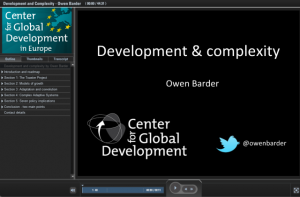
This is a special edition of Development Drums. Instead of interviewing a guest, as normal, we bring you a presentation on Complexity and Development by Owen Barder.
This is the audio-only version of an online presentation with slides, which is available from the Center for Global Development.
You can also download the slides and full transcript.
In this presentation, adapted from his Kapuściński Lecture of May 2012, Owen Barder explores the implications of complexity theory for development policy. He explains how traditional economic models have tried and failed to understand why some countries have managed to improve living standards while other countries have not. Drawing on ideas about complex adaptive systems developed in in physics and biology, he argues that development is a property of a system, not the sum of what happen s to the people within it.
This view of development has important policy implications for policy-makers who want to bring about faster development in their own country, or to help other countries to make faster progress. The presentation finishes with seven implications for development policy.
This Development Drums podcast is just the audio, for those who want to listen to the presentation in the gym or during their commute. If you would rather see the full presentation including slides, you can do so on the CGD website.
Size: 41.5 Mb
Podcast: Play in new window | Download
Subscribe: RSS

